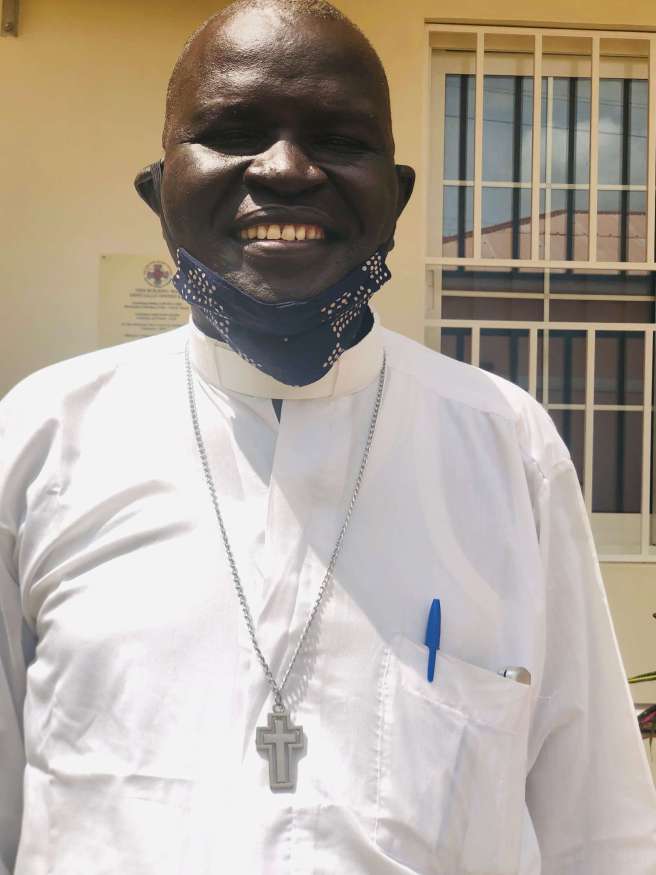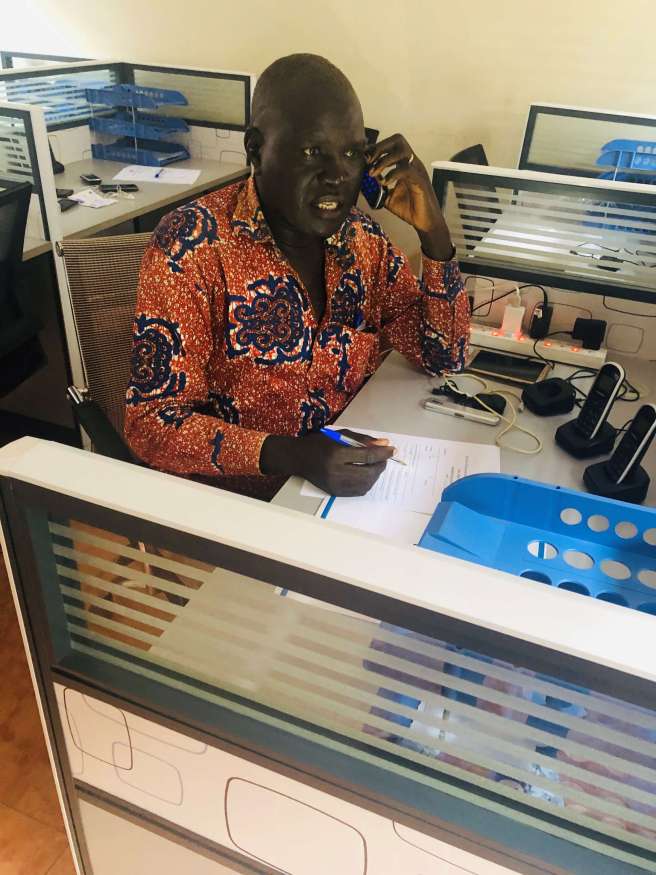For people in South Sudan, fears around coronavirus are very similar to those felt here back home. Lockdowns leave the vulnerable lonely and parents worry about the dangers of sending children to school and what the impact might be of them missing out on an education as schools begin to re-open.
And just like here, there is also the damage caused by ‘fake news’, which undermines efforts to keep people safe from coronavirus and has added to an atmosphere of fear in the country.
Trying to help people overcome all of these issues is Rev. Canon Emmanuel Nattania Bandi. As well as being the pastor for All Saints Cathedral in Juba, the country’s capital, he is also volunteer counsellor on a Christian Aid supported coronavirus freephone helpline.
The 54-year-old explained to Christian Aid Ireland that as well as reaching the general public, the coronavirus helpline was established to provide emotional support to coronavirus patients and frontline healthcare workers as well as those looking after family members with the virus or who have lost loved ones to it.
Image credits and information

Some people call us with feelings of stigma and of loneliness as a result of having to quarantine at home. They feel like they are alone, there is no one who can be next to them and be with them.
Others are concerned about the re-opening of schools, parents want to see their children going back so they can continue with their education but they want to know what measures are going to be put in place to safeguard the lives of their children from the virus.
In recent months, the number of confirmed cases of coronavirus has continued to rise across South Sudan and at present stands at nearly 3,000. While the official numbers are relatively low, the lack of testing – nearly 37,000 carried out so far – means, that the scale of the health crisis could be far worse.
South Sudan is ill-equipped to cope with a spike in cases and things are made even harder with only 1 in 10 people able to easily access clean water. And for those who do fall seriously ill, the chance of receiving treatment is slim as the world’s youngest country only has four ventilators and 24 ICU beds for its population of nearly 11 million people.
With funding from Irish Aid, Christian Aid have reached over 16,000 vulnerable people in the north of the country with awareness-raising on the importance of physical distancing and regular handwashing and have distributed 2,400 bars of soap and set up around 350 handwashing facilities to help ensure people are better able to prevent the spread of coronavirus.
Christian Aid is also working with a local partner to raise awareness of the virus in slums and poor neighbourhoods of Juba and have trained two home-based care teams who can provide care for family members in these areas who have symptoms of coronavirus and are self-isolating at home, as well as be able to quickly refer them on for medical treatment should their condition deteriorate.
“It is not easy, but we stress the importance of following the guidelines to stop the spread of coronavirus,” Rev. Emmanuel says. “We encourage callers to wash their hands with soap and water, to keep physical distance and to wear their masks whenever they are in a crowded place,” the Rev adds.
Part of the role of this awareness raising is also to counter the impact of fake news, which can spread even faster than the virus.
“Some people say that if someone catches coronavirus then they may not be able to have children in the future. Some people are even saying if you take hot water or bitter lemon, it will help you recover from coronavirus. They don’t have accurate information,” says Rev. Emmanuel.
At the beginning of the pandemic back in March, the government of South Sudan introduced a number of restrictions in order to prevent coronavirus from spreading, which included a ban on mass gatherings and the closing of places of worship, with restrictions on religious services only lifting in recent weeks. During this period, the helpline provided callers with information on how to practice their faith in line with public health advice, as well as how to ensure funerals can be conducted safely.
“During the pandemic, we have urged believers to attend worship from home, through their radios, through the internet and through social media and so on,” he says.
Rev. Emmanuel firmly believes that the trust built up between the churches in South Sudan means faith leaders can help curb the spread of coronavirus by sharing accurate information on the steps people need to take to reduce the risk to themselves and to others of contracting the virus.
The church is the voice for the voiceless and we have seen this throughout the history of South Sudan when the churches stood by the people, spoke for the people and worked for the people and that created the trust between the people and the church.




